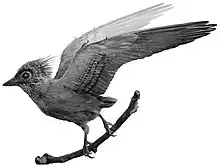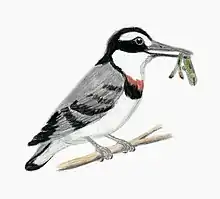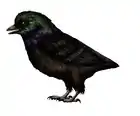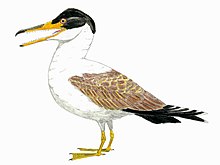Erliansaurus
Erliansaurus (meaning "Erlian lizard") is a genus of therizinosaur theropod dinosaur that lived in Asia during the Cenomanian stage of the Late Cretaceous period in what is now Nei Mongol, Iren Dabasu Formation.
| Erliansaurus Temporal range: Late Cretaceous, ~ | |
|---|---|
 | |
| Mounted skeleton cast | |
| Scientific classification | |
| Domain: | Eukaryota |
| Kingdom: | Animalia |
| Phylum: | Chordata |
| Clade: | Dinosauria |
| Clade: | Saurischia |
| Clade: | Theropoda |
| Superfamily: | †Therizinosauroidea |
| Family: | †Therizinosauridae |
| Genus: | †Erliansaurus Xu et al. 2002 |
| Type species | |
| †Erliansaurus bellamanus Xu et al. 2002 | |
Discovery and naming

The remains of Erliansaurus were found near Sanhangobi in Inner Mongolia in 1999. The type species, Erliansaurus bellamanus, was described by Xu Xing, Zhang Xiaohong, Paul Sereno, Zhao Xijin, Kuang Xuewen, Han Jun and Tan Lin in 2002. The generic name refers to the town of Erlian and the specific name is derived from Latin bellus, "beautiful", and manus, "hand", in reference to the exquisite preservation of the forelimb.[1]
The holotype, LH V0002, was uncovered in the Iren Dabasu Formation dating from the Cenomanian stage. It consists of a partial skeleton belonging to a subadult individual. It includes two cervical, one dorsal and two caudal vertebrae; a right scapula; a left forelimb only lacking the carpus; a partial right ilium and a fragmented ischium and pubis; the right femur; both tibiae, a right fibula and partial metatarsals. No skull traces were found.[1]
Description
The holotype specimen represents a not fully-grown individual based on one unfused caudal vertebra, and therefore its adult size may be larger than the contemporary Neimongosaurus.[1] It was a small to medium-sized therizinosaur with an estimated length from 2.6 to 4 m (8.5 to 13.1 ft) and a weight of 91 to 400 kg (201 to 882 lb).[2][3]
Erliansaurus was a bipedal herbivore. For a therizinosauroid, its cervicals were rather short. The preserved femur was very straight and had a very rounded femoral head; it measures 41.2 cm (412 mm). The tibia was relatively elongated, measuring 37.3 cm (373 mm) long. Its fibula had an uncommon form, with a very high front edge and a concave top. The left arm is exceptionally preserved with almost every element intact, its hands bore enormous, strongly recurved and pointed claws of which the thumb claw was the largest, however, the carpal bones are missing.[1]
Classification
Erliansaurus was by the describers assigned to the Therizinosauroidea, in a basal position and likely not a therizinosaurid.[1] The cladistic analysis performed by the revision of Zanno in 2010 recovered it as a therizinosauroid.[4] Some early cladistic analyses however, have recovered it as a basal member of the Therizinosauridae. The cladogram below is the result of the recently performed phylogenetic analysis of the Therizinosauridae by Hartman et al. 2019.[5]
| Therizinosauridae |
| |||||||||||||||||||||||||||||||||||||||||||||||||||||||||
See also
References
- Xu, X.; Zhang, Z.-H.; Sereno, P. C.; Zhao, X.-J.; Kuang, X.-W.; Han, J.; Tan, L. (2002). "A new therizinosauroid (Dinosauria, Theropoda) from the Upper Cretaceous Iren Dabasu Formation of Nei Mongol" (PDF). Vertebrata PalAsiatica. 40: 228–240.
- Holtz, T. R.; Rey, L. V. (2007). Dinosaurs: The Most Complete, Up-to-Date Encyclopedia for Dinosaur Lovers of All Ages. Random House. ISBN 9780375824197. Genus List for Holtz 2012 Weight Information
- Paul, G. S. (2016). The Princeton Field Guide to Dinosaurs (2nd ed.). Princeton, New Jersey: Princeton University Press. pp. 151−152. ISBN 9780691167664.
- Zanno, L. E. (2010). "A taxonomic and phylogenetic re-evaluation of Therizinosauria (Dinosauria: Maniraptora)". Journal of Systematic Palaeontology. 8 (4): 503–543. doi:10.1080/14772019.2010.488045. S2CID 53405097.
- Hartman, S.; Mortimer, M.; Wahl, W. R.; Lomax, D. R.; Lippincott, J.; Lovelace, D. M. (2019). "A new paravian dinosaur from the Late Jurassic of North America supports a late acquisition of avian flight". PeerJ. 7: e7247. doi:10.7717/peerj.7247. PMC 6626525. PMID 31333906.
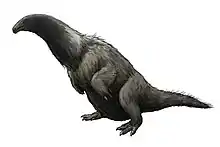
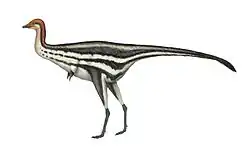
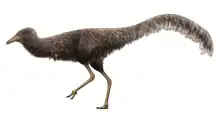
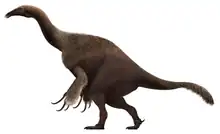
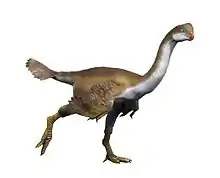
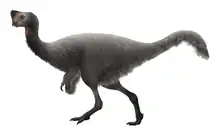
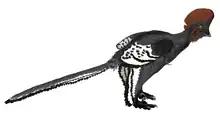


.png.webp)

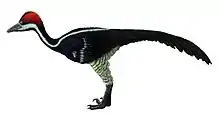
.jpg.webp)
